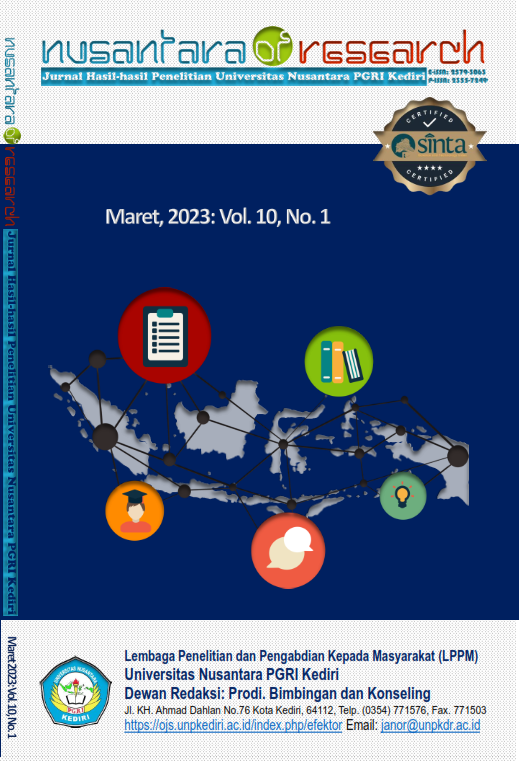The Validity of Pori Media (Speaking Room Podcast) in Improving High School Students' Self Esteem
Main Article Content
Abstract
This study aims to increase students' self-esteem based on the urgency of the problems felt by teenagers at the high school level. The research model applied is the Borg and Gall Research and Development procedure. The procedure consists of three steps, namely preliminary studies, planning and development of media products and product testing. At the product test stage, two tests were carried out, namely the expert test and the prospective user test. Collecting data using an acceptability questionnaire as an assessment of media products and a self-esteem questionnaire as an assessment. The results of the PORI media research meet the criteria for accuracy, use, through the results of expert tests and prospective users. However, this research stops at the stage of potential users not reaching a limited group. The average obtained through the media and content expert test is 1, meaning that this media has very good acceptability and is grateful in theory. The results of the prospective user test on 60 respondents from high school students have a high category with a score of 80% of 48 respondents, a medium category of 18.3% of 11 respondents, and a low category of 1.6% of 1 respondent. So it can be said that the PORI media is grateful in increasing the self-esteem of high school students
Downloads
Article Details
Issue
Section
Authors who publish with this journal agree to the following terms:
- Copyright on any article is retained by the author(s).
- The author grants the journal, the right of first publication with the work simultaneously licensed under a Creative Commons Attribution License that allows others to share the work with an acknowledgment of the work’s authorship and initial publication in this journal.
- Authors are able to enter into separate, additional contractual arrangements for the non-exclusive distribution of the journal’s published version of the work (e.g., post it to an institutional repository or publish it in a book), with an acknowledgment of its initial publication in this journal.
- Authors are permitted and encouraged to post their work online (e.g., in institutional repositories or on their website) prior to and during the submission process, as it can lead to productive exchanges, as well as earlier and greater citation of published work.
- The article and any associated published material is distributed under the Creative Commons Attribution-ShareAlike 4.0 International License
How to Cite
References
Baron and Byrne. 2002. Psikologi Sosial Jilid I. Jakarta: Erlangga.
Branden, N. 1992. The Power of Self Esteem. Florida: Health Communication Inc.
Dachmiati, S., dan Amalia, R. 2017. “Layanan Bimbingan Kelompok untuk Meningkatkan Self-Esteem Siswa”. Jurnal Fokus Konseling. Vol. 3. No. 2, Hal 149.
Guindon, M.H. 2009. Self-Esteem Across The Lifespan: Issues and Interventions.
Habsy, B. A. 2017. “Model Konseling Kelompok Cognitive Behavior untuk Meningkatkan Self Esteem Siswa SMK”. Jurnal PERSPEKTIF Ilmu Pendidikan. Vol. 31. No. 1, Hal 21-35.
Handaka, I. B., dan Maulana, C. 2017. “Peran Guru Bimbingan dan Konseling dalam Implementasi Gerakan Literasi Nasional”. Prosiding Seminar Bimbingan dan Konseling. Vol. 1. No. 1, Hal 227-237.
Hidayati, N.W. 2016. “Hubungan Harga Diri dan Konformitas Teman Sebaya dengan Kenakalan Remaja”. Jurnal Penelitian Pendidikan Indonesia. Vol. 1. No 2, Hal 31-36.
Mayangsari, D., dan Tiara D. R. 2019. “Podcast sebagai Media Pembelajaran di Era Milenial”. Jurnal Golden Age Universitas Hamzanwadi. Vol. 2. No. 2, Hal 126-135.
Phillips, B. 2017. “Student-Produced Podcast in Language Learning-Exploring Student Perceptions of Podcast Activities”. IAFPR Journal of Education. Vol. 5. Issue 3.
Prasetya., Angga, D., Japar, M. 2020. “Web-based Cyber Counseling to Improve Students Counseling Interest”. Jurnal Bimbingan Konseling. Vol. 9. No. 2, Hal 144-150.
Puluhalawa, M., Djibran, R. M., dan Pautina, R. M. 2017. “Layanan Bimbingan Kelompok dan Pengaruhnya Terhadap Self-Esteem Siswa”. Proceeding Seminar dan Lokakarya Nasional Revitalisasi Laboratorium dan Jurnal Ilmiah dalam Implementasi Kurikulum Bimbingan dan Konseling Berbasis KKNI. Hal 301-309.
Refnadi, R. 2018. “Konsep Self Esteem Serta Implikasinya Pada Siswa”. Jurnal Educatio. Vol. 4. No. 1, Hal 16-22.
Riyani., dan Sari, A. Y. 2020. “Penggunaan Podcast untuk Memperbaiki Pengucapan (Pronunciation) Mahasiswa dalam Berbicara Bahasa Inggris”. Research Fair Unisri. Vol. 4. No 1, Hal 1-15.
Rosenberg, M. 1965. Society and The Adolescent Self-Image. Princeton, NJ: Princeton University Press.
Santrock, J. W. 2003. Adolescence: Perkembangan Remaja. Jakarta: Erlangga.
Sriyono, H. 2017. “Efektivitas Layanan Bimbingan dan Konseling di Sekolah untuk Meningkatkan Kepercayaan Diri Siswa”. Research and Development Journal of Education. Vol. 4. No. 1, Hal 23-43.
Sukoco, dan Nurindah, N. 2018. “Upaya Meningkatkan Minat Mengikuti Layanan Bimbingan Klasikal Melalui Media Audio Visual”. Prosiding Seminar Bimbingan dan Konseling Karir di Era Disrupsi.
Tapp, D. 2013. “The Innovative Use of Podcasting to Support Under Represented Groups”. Innovative Practice in Higher Education. Vol. 1. No. 3, Hal 1-8.
Triwahyuningsih, Y. 2017. “Kajian Meta-Analisis Hubungan antara Self Esteem dan Kesejahteraan Psikologis”. Buletin Psikologi. Vol. 25. No. 1, Hal 26-35.
Wasi’ah, U. D. A. 2019. Bimbingan dan Konseling Islam dengan Family Therapy untuk Mengatasi Rendahnya Self Esteem Anak Broken Home di Wonocolo Surabaya. Skripsi. Universitas Islam Negeri Sunan Ampel Surabaya.
Zayana., Jumaidin L. O., dan Jaya, A. 2019. “Hubungan antara self esteem dengan School Bullying Pada Facebook Remaja SMA Negeri 4 Kendari”. Jurnal Ilmu Komunikasi UHO. Vol. 4. No. 4, Hal 135-144.




